What is the velocity v of a metallic ball of radius r failing in a tank of liquid at the instant when its acceleration is one-half that of a freely falling body? (The densities of metal and of liquid are and respectively, and the viscosity of the liquid is h)
1.
2.
3.
4.
5.
A tank is filled with water upto a height H. Water is allowed to come out of a hole P in one pf the walls at a depth D below the surface of water. Express the horizontal distance x in terms of H and D
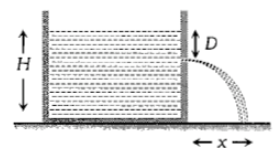
1.
2.
3.
4.
A U-tube od uniform cross section as shown in figure is partially filled with a liquid I. Another liquid II which does not mix with liquid I is poured into one side. It is found that the liquid levels of the two sides of the tube are the same, while the level of liquid I has risen by 2cm. If the specific gravity of liquid I is 1.1 the specific gravity of liquid II must be
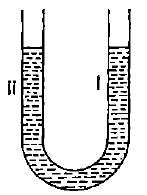
1. 1.12
2. 1.1
3. 1.05
4. 1.0
A tube of length h (which is wide enough so that surface tension effects can be neglected) is filled with air and closed at one end is lowered into a tank of mercury to a depth h as shown; so that mercury rises a distance x into the tube. If the mercury barometer also reads 'h', then
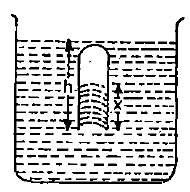
1.
2.
3.
4.
A U-tube of base length I filled with same volume of two liquids of densities is moving with an acceleration a on the horizontal plane. If the height difference between the two surfaces fopen to atmosphere) becomes zero, then height h is given by
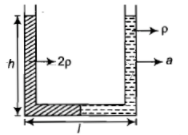
1.
2.
3.
4.
A faulty barometer contains some air which occupies 9.5 cc. If indicates 740 mm when a correct barometer indicates 750 mm, the volume the air would occupy under standard pressure
1. 0.0.95 cc
2. 0.125 cc
3. 1.25 cc
4. 12.5 cc
A hole is made at the bottom of the tank filled with water (density= 1000 kg/m3). If the total pressure at the botton of the tand is three atmoshphere (1 atmosphere = N/m2), then the velocity of efflux is
1.
2.
3.
4.
Kerosene oil rises up in the wick of a lantern because of
1. diffusion of the oil through the wick
2. surface tension
3. buoyant force of air
4. the gravitational pull of the wick
Three liquids of densioties d, 2d and 3d are mixed in equal proportions of weights. The relatice density of the mixture is
1.
2.
3.
4.
A capillary tube is dipped in a liquid. Let pressure at point A, B and C be respectively then
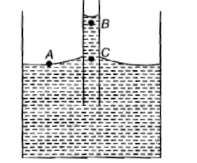
1.
2.
3.
4.






